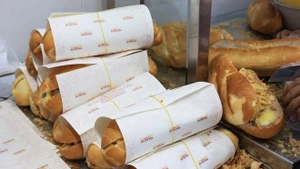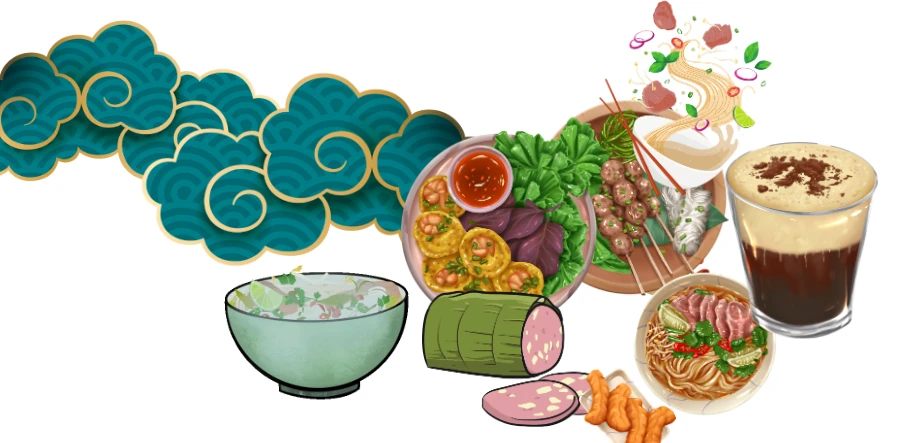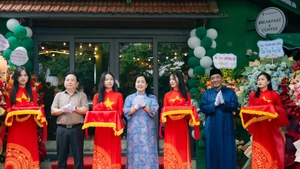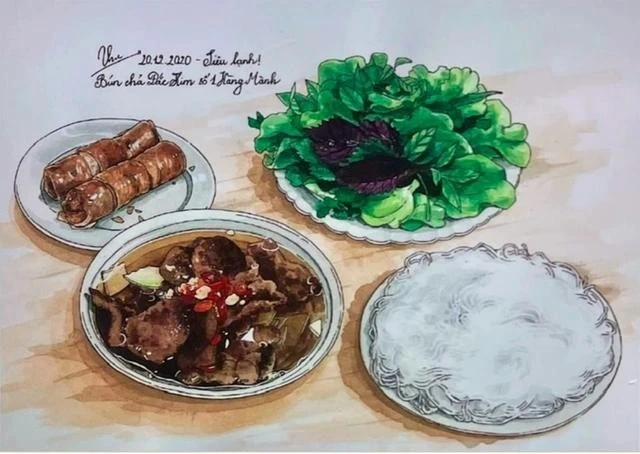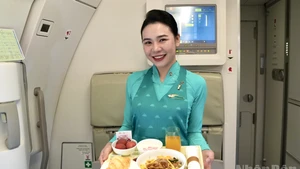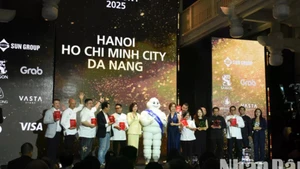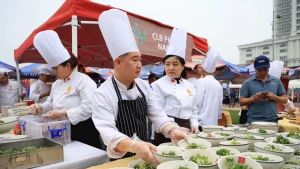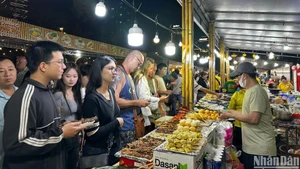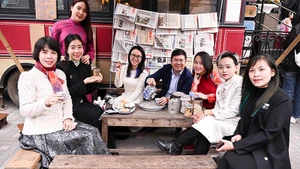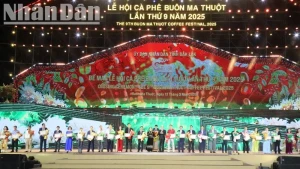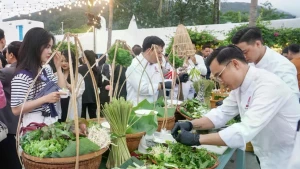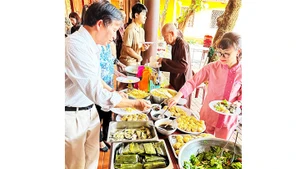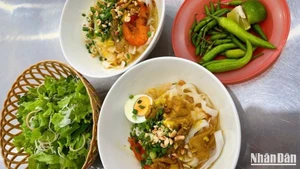Lifting the Vietnamese cuisine brand name
In Beijing, a city with more than 20 million people, a convergence of cuisines across China and many countries around the world, Vietnamese cuisine has gained a certain position among local gourmets. Chef Le Ngoc Quyen has contributed significantly to the building and development of the SuSu restaurant chain, with nearly a dozen branches throughout the city.
As a graduate of Ho Chi Minh City University of Food Industry and a student of veteran MasterChef, Pham Tuan Hai, Le Ngoc Quyen has lived and worked in Beijing for more than ten years. He was the founder of the first SuSu restaurant in Beijing in 2011.
To date, the restaurant has eight branches, located in most districts in Beijing, with more than 200 regular employees.
The menu includes signature dishes from all three regions of Vietnam, such as beef pho, fried spring rolls, La Vong grilled fish, Hue beef noodles, ‘banh mi’, and papaya salad.
According to Le Ngoc Quyen, he had to spend considerable time and effort choosing a location to open a restaurant. In Beijing, those looking for restaurants serving foreign cuisine, including Vietnamese, are often young people or those willing to spend money and have travelled abroad.
Therefore, it is necessary to choose places where young people and visitors check in and go shopping often, such as the old town, tourist attractions or shopping centres.
It is also crucial to develop an elaborate and sophisticated restaurant menu. The entire restaurant chain offers hundreds of dishes from different regions of Vietnam, but 40% of the dishes on the branch's menu do not overlap each other, even though their locations are less than 1 km apart, bringing diners different and new experiences.
An authentic Vietnamese restaurant must retain the quintessence of Vietnamese cuisine, as well as the characteristics of the region, from the selection of ingredients to traditional spices.
Quyen said that an authentic Vietnamese restaurant must retain the quintessence of Vietnamese cuisine, as well as the characteristics of the region, from the selection of ingredients to traditional spices.
Therefore, in 2018, the restaurant opened the first and only Vietnamese fresh pho production factory in Beijing, providing about 400 to 500 kg of pho to its branches and other Vietnamese restaurants every day. The restaurant also has its town ‘banh mi’ making factory, which produces around 200 loaves of ‘banh mi’.
While talking about his secret to success, Quyen said that in addition to preserving traditional Vietnamese flavours, it is also necessary to elevate Vietnamese cuisine by continuing to learn and update trends and styles. Culinary styles are popular locally and around the world, especially in the shaping and decoration of dishes. This not only helps to increase the value of the dishes, but also brings Vietnamese cuisine to new heights, reaching out to the world.
As a result, the customer retention rate at Quyen’s restaurant chain sits at about 30%. Many diners said that they had enjoyed Vietnamese food during their travels, and by coming to SuSu restaurant, they not only experienced authentic Vietnamese flavours but also felt the beauty and quintessence of Vietnamese culinary culture.
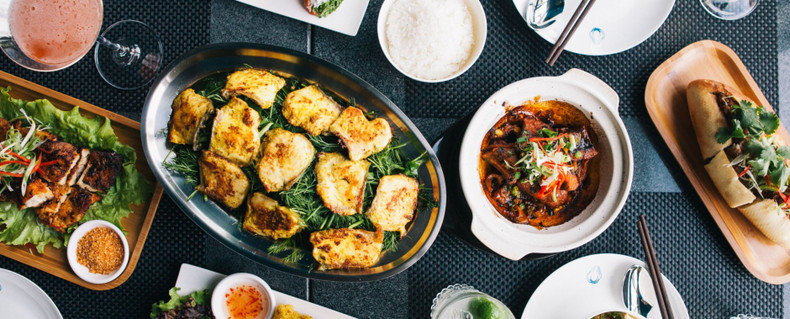 |
| Vietnamese dishes at SuSu restaurant. |
Spreading Vietnamese cultural beauty
More than three years of the COVID-19 pandemic outbreak was a difficult period for Chef Le Ngoc Quyen and Vietnamese restaurants because China was the country that applied the most stringent restrictions under the Zero-COVID policy.
During the three waves of the COVID-19 outbreak, restaurants had to close for many months, causing revenue to drop to only 30% compared to before the epidemic. To retain employees, the SuSu restaurant chain cut working hours but still guaranteed 75% of salary and support.
The biggest difficulty is that after each outbreak, the restaurant lost more than 40% of its trained employees, causing many obstacles to the process of restoring business activities. To solve the problem of lack of human resources, Quyen said, the restaurant promptly connected with vocational training establishments in Beijing, looking for trained students who could meet the job immediately.
The efforts to overcome difficulties have paid off, as the Chinese market witnessed a "boom" in consumption in the post-COVID-19 period, and the SuSu restaurant chain received a bustling number of customers like before. At peak times, diners stand in long lines, and some wait for hours to enjoy Vietnamese dishes. The revenue of many branches was at a record high, exceeding the pre-epidemic period by 20% to 40%.
Throughout the journey of building a Vietnamese culinary brand in a market of 1.4 billion people, chef Le Ngoc Quyen has paid great attention to introducing and promoting Vietnamese culinary culture in particular, the country and the people of Vietnam in general.
On the restaurant menu, in addition to the names and images of the dishes, there is always an introduction about the origin, ingredients, preparation methods and related stories.
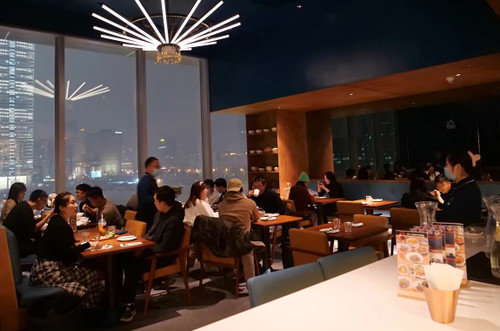 |
| A corner of the restaurant in Beijing. |
It is worth mentioning that most of this work is directly carried out by Quyen and his wife, based on thorough research on Vietnamese culinary culture, as well as the tastes of local consumers. Quyen also posted and promoted content about three-region dishes and Vietnamese culinary culture on major Chinese social networking platforms, such as Dianping, Xiaohongshu, and TikTok, receiving positive interaction and recognition from the public.
In addition, his restaurant also regularly participates in foreign promotional and cultural exchange activities held in Beijing and important events organised by the Vietnamese Embassy, such as celebrating the National Day, commemorating the establishment of bilateral diplomatic relations or a cultural festival organised by the embassies of the Netherlands, Germany, and France.
The most profound memory is probably participating in a press meeting event organised by the Dutch Embassy in Beijing, with the participation of dozens of reporters from major international news agencies and newspapers.
The Vietnamese dishes and culinary culture displayed and introduced here have made a strong impression on international journalists, through which many photos, videos and articles about Vietnamese cuisine have been introduced to international friends, becoming the driving force for Le Ngoc Quyen to continue his efforts to promote the beauty of the country and people of Vietnam.
"My wish is to be able to build a Vietnamese cuisine brand, to promote and spread Vietnamese culinary culture in China, one of the most populous countries in the world."
Chef Le Ngoc Quyen
“Vietnamese culinary culture is rich and diverse, unique and different, and completely comparable to the cuisine of other Asian countries. My wish is to be able to build a Vietnamese cuisine brand, to promote and spread Vietnamese culinary culture in China, one of the most populous countries in the world” - Quyen shared.
Hu Lirong, a diner from Shandong province, China, said that Vietnamese dishes are not only sophisticated in preparation and decoration, but also very frugal, good for health, and suitable for the modern culinary trend.
"Although I have never been to Vietnam, through enjoying Vietnamese dishes, I can somewhat feel the culture and people of Vietnam, as well as have more motivation to travel to Vietnam in the near future," she said.
At the end of the year, busy preparing for the opening of two more Vietnamese cuisine restaurants in Beijing City, chef Le Ngoc Quyen is also looking for like-minded chefs and eager Vietnamese students to start a business and participate in operating and expanding the Vietnamese restaurant chain.
He is also planning to open more branches in big cities such as Shenyang and Chengdu, exploiting the potential and opportunities coming from the billion-people consumer market so that more and more Chinese people know and love Vietnamese dishes, contributing to promoting culinary culture, the country and people of Vietnam.


